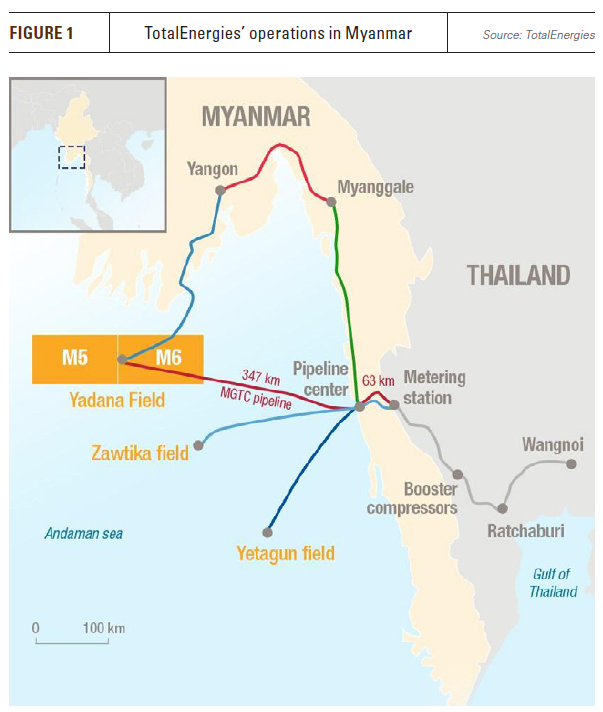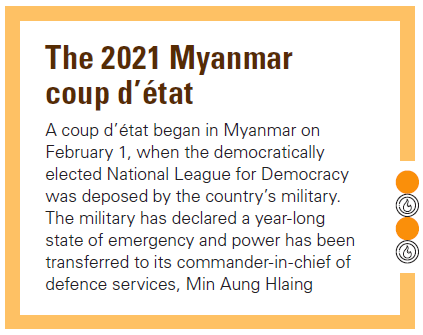Myanmar coup hamstrings exploration investment [Gas in Transition]
Foreign investors in Myanmar’s upstream are under mounting pressure to quit the country in the wake of the military’s coup on February 1.
Human rights activists have urged international developers to walk away until a democratically elected government is once more in power. Such a move would deny revenue streams to a regime that has reportedly killed at least 845 pro-democracy protestors and imprisoned thousands of others.
Many have listened, with Australia’s Woodside Energy being the first to announce that it was reducing its presence in the country, saying on February 27 that it would suspend its offshore exploration operations. For developers with producing fields, however, suspending operations may not be quite as simple.
Plugging the pipeline
French major TotalEnergies revealed on May 26 that the Moattama Gas Transportation Co (MGTC) joint venture had opted to suspend cash payments to its shareholders, which include the government’s Myanmar Oil and Gas Enterprise (MOGE).
MGTC operates the pipeline that delivers gas produced from the TotalEnergies-led Yadana gas field, which lies on offshore blocks M5 and M6, to customers in Thailand. TotalEnergies owns 31.24% of MGTC, while Chevron holds 28.26%, Thailand’s state-owned PTT Exploration and Production (PTTEP) has 25.5% and MOGE owns 15%. The four companies also partner in Yadana.
But while it condemned the “violence and human rights abuses” occurring in the country, TotalEnergies said it would maintain its gas production “in accordance with applicable laws”.
TotalEnergies chairman and CEO Patrick Pouyanne told his company’s shareholders on May 28 that the French energy major was reluctant to halt Yadana’s production, given that such a move would open up the company’s domestic team to legal action.
“First of all, the bulk of revenues come from the fact there’s a client that buys that production, which is Thai company PTTEP ... and then there are the taxes,” Pouyanne said. “Deciding to not pay taxes would mean we would be in breach of the law, there’s a criminal risk attached.”
Practically speaking, however, turning off the taps from Yadana may not have the same impact as freezing MGTC’s payments.
Pipeline polemic
TotalEnergies said it would suspend payments from MGTC just weeks after French daily Le Monde reported that the pipeline company had recorded staggering profits in 2017-2019.
 Le Monde, citing financial records on the Yadana project that were leaked by Distributed Denial of Secrets, reported on May 4 that MGTC generated $1.23bn in profits before tax in the three-year period, while costs only amounted to $22.3mn.
Le Monde, citing financial records on the Yadana project that were leaked by Distributed Denial of Secrets, reported on May 4 that MGTC generated $1.23bn in profits before tax in the three-year period, while costs only amounted to $22.3mn.
The paper pointed out that Yadana’s profit margin was just 13% and quoted unnamed oil and gas contract specialists as saying that the nature of the lopsided transportation and production profit split suggested “particularly aggressive tax optimisation”. These sources noted that transportation side taxes are, in general, much lower than those on production.
Given the stigma surrounding MGTC’s profit structure, the suspension of cash payments is an easier win than turning off Yadana’s operations, which would put the local workforce at risk. And while the move may elicit some saber-rattling from the Naypyidaw government, TotalEnergies and Chevron have relatively little upstream exposure.
“Regardless of whatever pressure the local authorities might put on them, with Blocks M5 and M6 entering their sunset years, TotalEnergies and Chevron can squeeze positive PR out of the situation by coming out on the side of the human rights campaigners,” Rystad Energy analyst Readul Islam told NGW.
But while MGTC’s western partners are striving to distance themselves from Myanmar’s military regime, Thai partner PTTEP is far less concerned with PR strategies. The state major must now re-evaluate its investment strategy that was supposed to help expand its presence throughout Myanmar’s entire gas chain.
Supply concerns
PTTEP has banked heavily on buying gas from Myanmar’s Yadana, Yetagun and Zawtika fields to feed Thailand’s gas-fired thermal power plants. Gas-based generation accounted for 62% of the country’s power mix in 2019 and Bangkok has outlined plans to expand this to 76% by 2030.

Islam said: “Pipeline gas from Myanmar makes up nearly 15% of Thailand’s annual gas usage, so anything that could affect these flows would be a highly sensitive matter for PTTEP and Thailand.”
Beyond its interest in Myanmar’s upstream, PTTEP has also pursued opportunities in the country’s downstream. It signed an agreement with the former government in December 2020 to develop a $2bn, 592-MW gas-to-power project, which would use gas from Blocks M3 and M9.
While the Myanmar government is still to sign off on the project’s field development plan (FDP), Rystad expects the project to face delays as a result of either current in-country turmoil or PTTEP’s reluctance to commit amid such instability.
Islam said: “Even if the government were able to approve the plan, PTTEP would probably be able to stall it, citing an uncertain domestic demand environment to justify the holdup. Barring sanctions, PTTEP will follow the laws of business, and would prefer to spend its money and management time on more certain projects in Thailand and Malaysia, for instance.”
Competitive environment
Foreign investors will be watching closely over the coming months to see whether sanctions are imposed on the country’s energy sector. But even if they are not, the long-term outlook for Myanmar’s gas production is increasingly pessimistic.

Exploration projects that had been billed as a means of reversing production declines have now been pushed to the backburner because of the coup. Moreover, the allure of the country’s upstream is simply not what it once was and even Chinese and Russian state-backed developers – companies with a history of investing in “pariah states” – may struggle to muster much enthusiasm for the Southeast Asian country.
Islam said: “Materiality is the issue – Myanmar’s upstream potential doesn’t appear to be so great. If money is to be spent on upstream, perhaps it’s better to wait for Iran to open up for business. And unlike in previous cycles, at least the Chinese players also need to contend with the fact that energy transition projects are now competing for funds.”
The global push for net zero emissions in the coming years will make geopolitically risky oil and gas investments much harder to justify. While Myanmar’s gas production is unlikely to suffer in the immediate aftermath the coup, the military’s grip on power will hobble further exploration investment and limit the country’s production potential in the long run.



